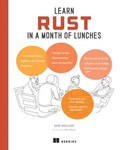One month. One hour a day. That’s all it takes to start writing Rust code!
Learn Rust in a Month of Lunches teaches you to write super fast and super safe Rust code through lessons you can fit in your lunch break. Crystal-clear explanations and focused, relevant examples make it accessible to anyone—even if you’re learning Rust as your first programming language.
By the time you’re done reading Learn Rust in a Month of Lunches you’ll be able to:
Learn Rust in a Month of Lunches is full of 24 easy-to-digest lessons that ease you into real Rust programming. You’ll learn essential Rust skills you can use for everything from system programming, to web applications, and games. By the time you’re done learning, you’ll know exactly what makes Rust unique—and be one of the thousands of developers who say it’s their best loved language!
About the technology
Learn how to create fast powerful programs in Rust in just 24 short lessons! Rust gives you modern features like a top-notch compiler, a rich ecosystem of pre-built libraries, and the same low-level performance you get with a language like C, but without the awkward syntax, complex memory management, and code safety concerns. This book guides you step by step from your first line of code.
About the book
Learn Rust in a Month of Lunches breaks down the Rust language into concise hands-on lessons designed to be completed in an hour or less. The examples are fun and easy to follow, so you’ll quickly progress from zero Rust knowledge to handling async and writing your own macros. You won’t even need to install Rust—the book’s code samples run in the browser-based Rust Playground. There’s no easier way to get started!
What's inside
About the reader
No previous experience with Rust required.
About the author
Dave MacLeod was an educator, Korean-English translator, project controller, and copywriter before becoming a full-time Rust developer. The technical editor on this book was Jerry Kuch.
Table of Contents
1 Some basics
2 Memory, variables, and ownership
3 More complex types
4 Building your own types
5 Generics, option, and result
6 More collections, more error handling
7 Traits: Making different types do the same thing
8 Iterators and closures
9 Iterators and closures again!
10 Lifetimes and interior mutability
11 Multiple threads and a lot more
12 More on closures, generics, and threads
13 Box and Rust documentation
14 Testing and building your code from tests
15 Default, the builder pattern, and Deref
16 Const, “unsafe” Rust, and external crates
17 Rust’s most popular crates
18 Rust on your computer
19 More crates and async Rust
20 A tour of the standard library
21 Continuing the tour
22 Writing your own macros
23 Unfinished projects: Projects for you to finish
24 Unfinished projects, continued

